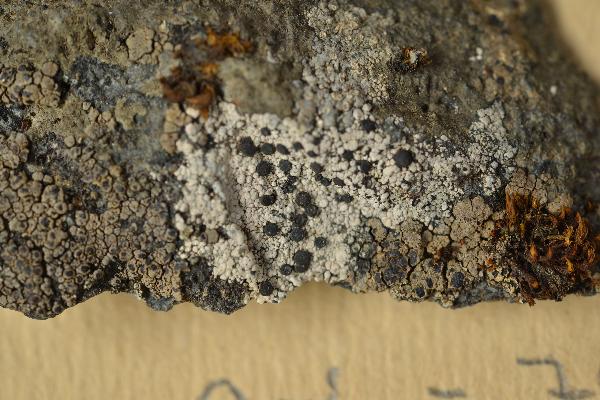Miriquidica complanata (Körb.) Hertel & Rambold
Mitt. bot. Staatss. München, 23: 382, 1987. Basionym: Lecanora complanata Körb. - Parerga Lichenol.: 84-85, 1859.
Synonyms: Aspicilia complanata (Körb.) Stein; Aspicilia microlepis Körb.; Aspicilia superiuscula (Nyl.) Hue; Lecanora coracodes Nyl.; Lecanora kultalensis Vain.; Lecanora microlepis (Körb.) Lettau; Lecanora superiuscula Nyl.; Lecanora tenebricans Nyl.; Lecidea vezdae V. Wirth
Distribution: N - TAA (Nascimbene & al. 2022), Piem (Isocrono & al. 2004), VA (Piervittori & Isocrono 1999). C - Sar (Nöske 2000).
Description: Thallus crustose, episubstratic, continuous to rimose-areolate, pale grey to bluish grey, of (0.3)0.4-1(-1.8) mm wide, rounded or minutely lobed, flat to slightly convex areoles scattered on a black hypothallus. Medulla white, I-. Apothecia lecideine, (0.2-)0.5-0.7(-1) mm across, at first immersed in the areoles then slightly prominent, usually 1 per areole, with a dark brown to black, mostly flat disc, and a very thin, poorly evident and soon excluded proper margin. Proper exciple poorly developed, thin, dark brown to olive-brown in outer part, of radiating hyphae; epithecium brown; hymenium colourless to yellowish, 50-65 µm high, I+ blue; paraphyses sparingly branched and more or less anastomosing, 1.5-2 µm thick at mid-level, the apical cell clavate, 3-4.5 µm wide, with a dark cap; hypothecium colourless, yellowish or grey. Asci 8-spored, clavate, approaching the Lecanora-type, but with a weakly amyloid tholus, lacking an amyloid zone above the axial body and with a thin outer amyloid wall layer. Ascospores 1-celled, hyaline, ellipsoid to oblong, (8-)10-16(-18) x (4-)5-6(-7) µm. Photobiont chlorococcoid. Spot tests: thallus K-, C-, KC-, P-. Chemistry: miriquidic acid. Note: on moist siliceous rocks in upland areas, starting the life-cycle on yellow Rhizocarpon-species, with optimum above treeline. The identification of the samples from Sardinia is dubious.
Growth form: Crustose
Substrata: rocks
Photobiont: green algae other than Trentepohlia
Reproductive strategy: mainly sexual
paras Rhizocarpon geographicum when young
Commonnes-rarity: (info)
Alpine belt: rare
Subalpine belt: very rare
Oromediterranean belt: extremely rare
Montane belt: extremely rare
Submediterranean belt: absent
Padanian area: absent
Humid submediterranean belt: absent
Humid mediterranean belt: absent
Dry mediterranean belt: absent

Predictive model
Herbarium samples
Growth form: Crustose
Substrata: rocks
Photobiont: green algae other than Trentepohlia
Reproductive strategy: mainly sexual
paras Rhizocarpon geographicum when young
Commonnes-rarity: (info)
Alpine belt: rare
Subalpine belt: very rare
Oromediterranean belt: extremely rare
Montane belt: extremely rare
Submediterranean belt: absent
Padanian area: absent
Humid submediterranean belt: absent
Humid mediterranean belt: absent
Dry mediterranean belt: absent

Predictive model
| Herbarium samples |
 INDEX FUNGORUM
INDEX FUNGORUM
 GBIF
GBIF
 DOLICHENS
DOLICHENS





